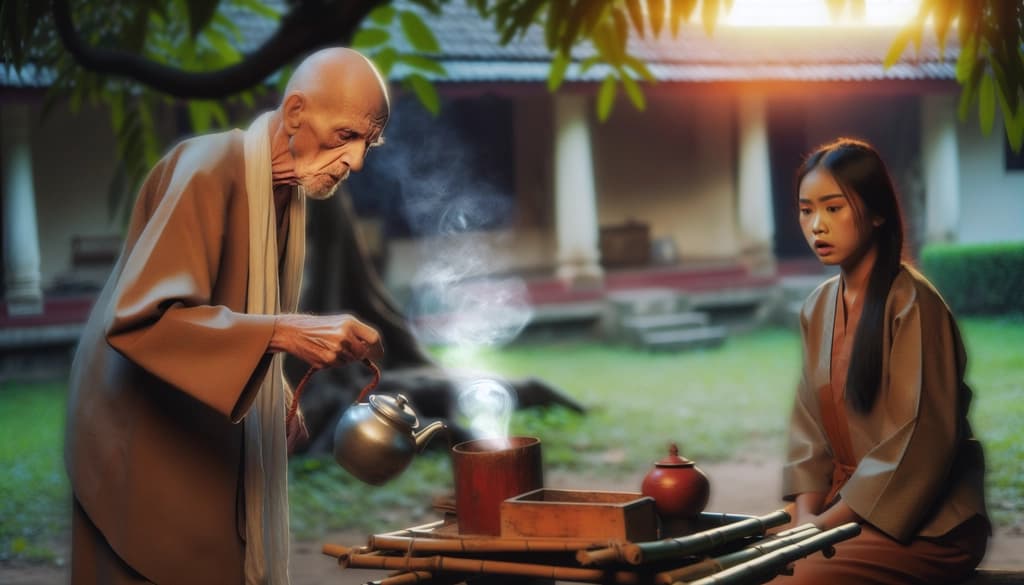Why Zen Stories Speak in Paradox: The Wisdom Behind the Empty Cup

There may come a point when the words you’ve relied on for comfort—the stories you tell about yourself, the lessons you seek—begin to lose their soothing edge. In moments of emotional churn or quiet exhaustion, advice can feel flat and formulaic. Zen stories, with their riddles and reversals, step into this gap between what we can think and what we truly sense.
Paradox as a Mirror, Not a Map
If you’re carrying the expectation that Zen will offer you clear directions or comforting affirmations, its paradoxes can feel unnecessarily frustrating. Yet for centuries, Zen teachers have used these stories to invite us into a deeper kind of meeting—with uncertainty, with ourselves.
“A Zen master gave me a riddle instead of an answer. I was angry at first—then, something loosened in me. I stopped searching and started noticing.”
Paradox in Zen doesn’t aim to confuse you for its own sake. It is the language of inner transformation, where truth can only be hinted at—not handed over. The story turns you gently back toward the felt sense of your own questions, breaking the spell of certainty. Sometimes, not knowing is the truest doorway in. If you’re drawn to explore further, the Zen koans meaning opens up even more nuance around these riddles.
The Parable of the Empty Cup—Making Room for Reality
One of Zen’s most cherished parables is that of the empty cup. A student comes to the teacher, eager to receive knowledge. The teacher pours tea until the cup overflows and keeps pouring, saying, “Like this cup, you are full of your own opinions and ideas. How can I show you Zen unless you first empty your cup?”
The cup, in its emptiness, is not a symbol of lack but an invitation to become available. Only when we loosen our grip on what we think we know—about how healing should look, or who we are supposed to be—does something quiet and real find its way in. Some teachers speak to the ego using gentle stories; you may also find nourishment in the Parable about the ego, which holds its own mirror to the patterns we carry.
Symbolism and Felt Truth in Zen Practice
Paradox and symbolism, woven through Zen stories, are not puzzles meant to be solved but mirrors meant to show us the tangle of our own habits. When a teacher answers a question with silence, or with a story that seems to contradict itself, you’re being invited to pause your search for intellectual clarity. The real wisdom arises not from solving the riddle, but from tasting its emotional edge—the way it unsettles, softens, or opens you. Other spiritual stories with meaning can offer further gentle doorways to this kind of direct seeing.
Researchers who study mindfulness have noticed that when people let go of fixed narratives—even briefly—they report a sense of relief and a subtle, fresh seeing. Paradox aims for something similar: instead of one more idea to clutch, it gently encourages us to witness our experience as it is, moment by moment. The Story of the blind men and elephant offers another poetic way of exploring how perspectives shape—and limit—what we know.
Transmission Beyond Words
In Zen, truth can’t fully be taught in words. It’s handed from teacher to student in a transmission that happens beneath language. The stories, koans, and paradoxes are simply invitations—a pointing finger, not the moon itself. For other reflections on how wisdom travels person to person, you may appreciate Wisdom from spiritual teachers.
You might find that, on some quiet day, a puzzle you once wrestled with now feels alive in your heart, asking gently for your presence, not your understanding. If you wish to see how others have tried to put this into words, Wisdom quotes explained add gentle resonance to this ancient tradition.
If it feels right, you might let yourself sit with a story—perhaps the parable of the empty cup—and notice what it stirs in you. There is nothing you must solve; only a soft returning to your own experience, as it is. If you're drawn to the heart of Zen's method, you might enjoy further reflection on the Transmission of truth.
May you rest into the mystery, finding nourishment even in what cannot be explained.
